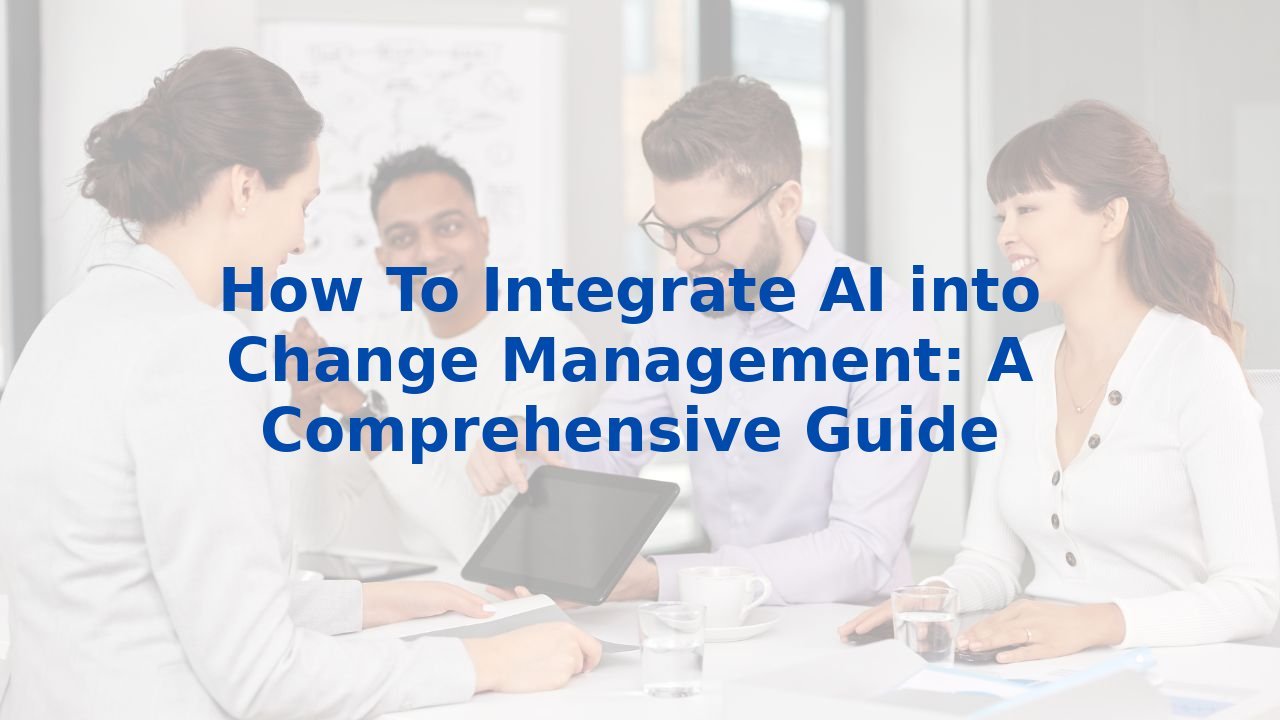How To Integrate AI into Change Management: A Comprehensive Guide
How To Integrate AI into Change Management: A Comprehensive Guide
Introduction
In today’s rapidly evolving business landscape, organizations are no longer just optimizing processes; they’re revolutionizing them. One of the most powerful allies in this transformational journey is Artificial Intelligence (AI). For businesses that recognize change management as a critical component of success, integrating AI can enhance efficiency, drive informed decision-making, and foster growth. In this guide, we'll dive into how AI can be woven seamlessly into change management, along with the indispensable importance of training employees in these advanced capabilities.
1. Change Management Enhanced by AI
Every transformational initiative demands a robust change management strategy. This is where AI can become a game-changer. By employing AI technologies, organizations can sharpen their approach to handling change effectively.
Data Analysis:
The backbone of change management is data. AI algorithms excel at processing vast amounts of data quickly, spotting patterns that human analysis might overlook. This means organizations can make informed decisions backed by solid facts, reducing risks associated with uncertain outcomes.
Predictive Modeling:
Imagine being able to foresee the impacts of various change management strategies before implementing them. With AI-driven predictive modeling, historical and current data can be harnessed to forecast future scenarios. This foresight allows businesses to select strategies that are more likely to yield successful outcomes.
Personalized Learning:
Every employee learns differently. AI can tailor learning pathways to individual needs, ensuring the right support and information flows to those who need it most. By enhancing the learning experience, employee engagement during transitional phases improves significantly.
2. Unlocking AI’s Potential in Marketing
While change management sets the stage for transformation, marketing can become the powerful channel that delivers on this promise. AI's role in marketing has evolved from automation to intelligence.
Personalization:
Today's consumers seek personalized experiences. AI analyzes customer interactions and preferences to craft tailored marketing campaigns. This not only increases engagement rates but also enhances the overall customer experience.
Content Generation:
Time is an invaluable resource. AI can streamline the content creation process by generating high-quality content, freeing up valuable team resources to focus on strategic initiatives.
Analytics:
Real-time analytics fueled by AI can reshape marketing strategies. Understanding what works and what doesn’t leads to agile adjustments, maximizing efficacy and ensuring campaigns resonate well with target audiences.
3. Revolutionizing Instructional Design with AI
In an age where education and training are keys to employee growth, AI is paving the way for new methodologies.
Content Generation:
Gone are the days of manually creating extensive course materials. AI can produce educational content efficiently, redefining how learning resources are developed.
Personalized Learning:
Just like in change management, AI can optimize individualized learning experiences. Tailoring educational pathways ensures that information provided is relevant and engaging, thus enhancing knowledge retention.
Adaptive Learning:
AI systems can assess student performance in real-time, adjusting content difficulty accordingly. This responsive approach to education promises a richer learning experience and empowers learners to master concepts at their own pace.
4. Elevating Efficiency Through Employee Training
Integrating AI into various business processes is only part of the equation. The human element remains crucial. Training employees on AI enhances their ability to utilize these powerful tools effectively.
Enhanced Efficiency:
Well-trained employees can leverage AI tools and adapt to new technologies seamlessly, leading to impressive boosts in operational efficiency.
Improved Decision-Making:
When employees understand AI, they become better equipped to interpret its insights, leading to more informed decision-making. This, in turn, fosters an environment of confidence in their roles during change initiatives.
Innovation:
Empowered staff members are often the first to recognize where AI can be best applied, sparking innovative ideas and strategies that can set the organization apart from the competition.
Conclusion
The integration of AI into change management is more than just a technological upgrade; it is a transformative strategy that can propel organizations toward future successes. Through data-driven insights, personalized experiences, and enhanced decision-making processes, AI reshapes how organizations navigate change. And as crucial as the technology itself, investing in employee training is essential for realizing the full potential of AI. In an ever-changing world, embracing these innovations will undoubtedly signify the difference between thriving and merely surviving.
Every journey toward organizational excellence begins with insightful choices; in this case, AI stands as a beacon illuminating the path ahead.



